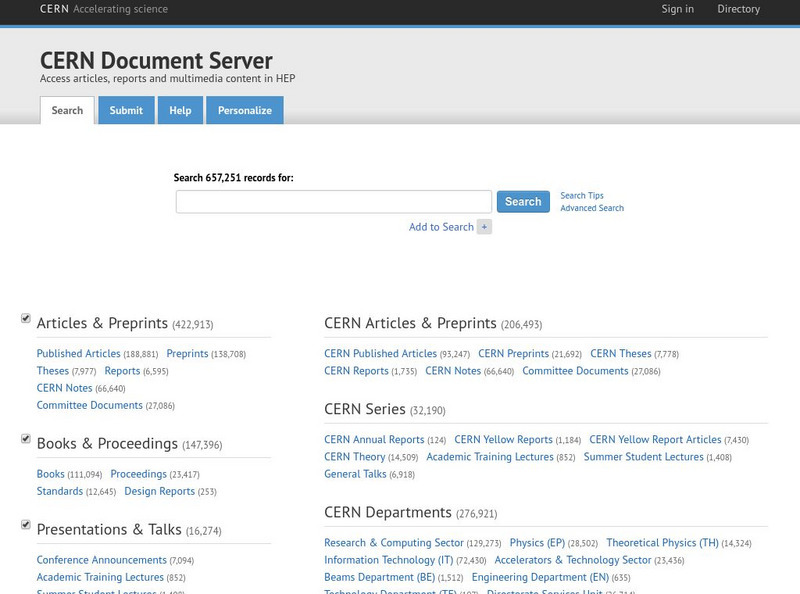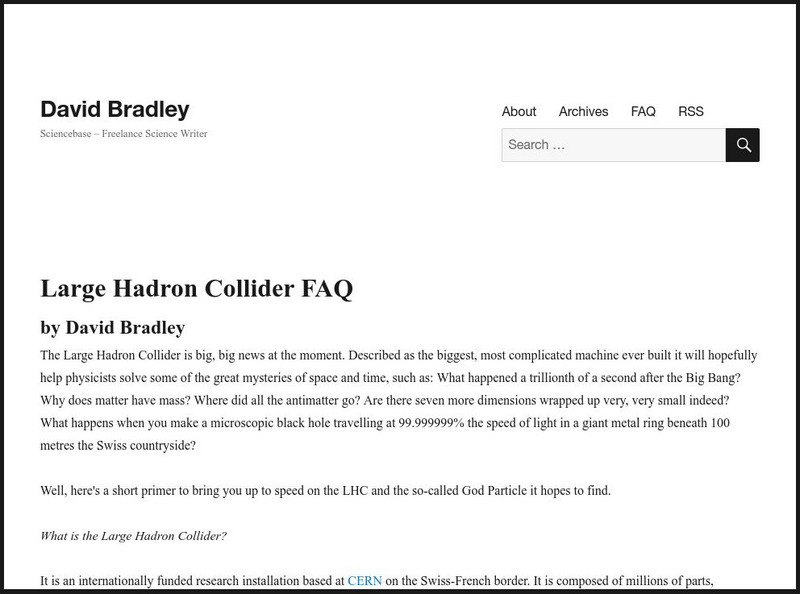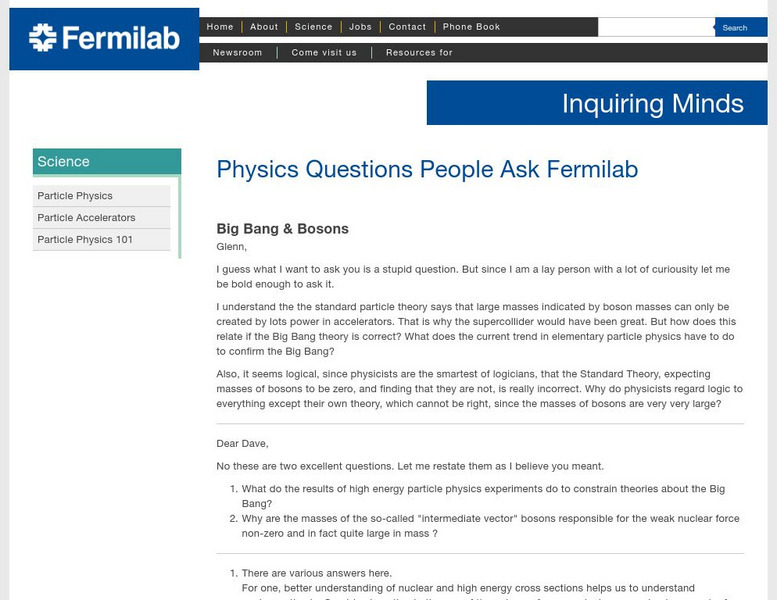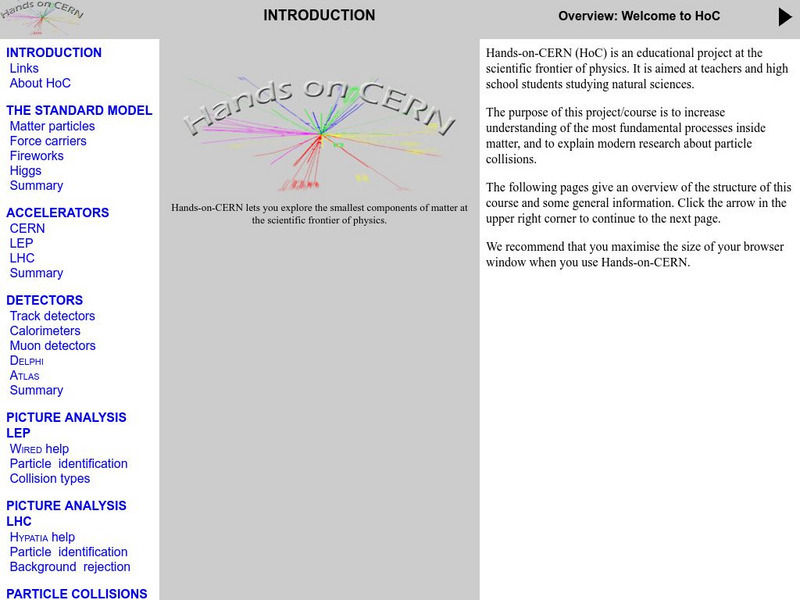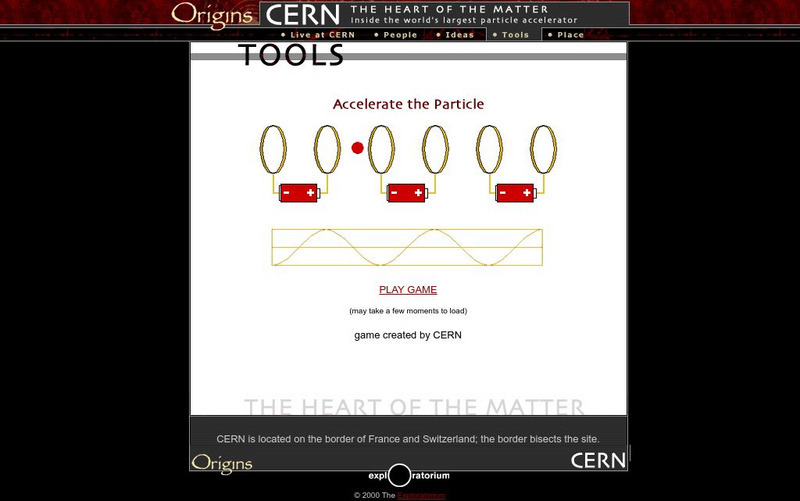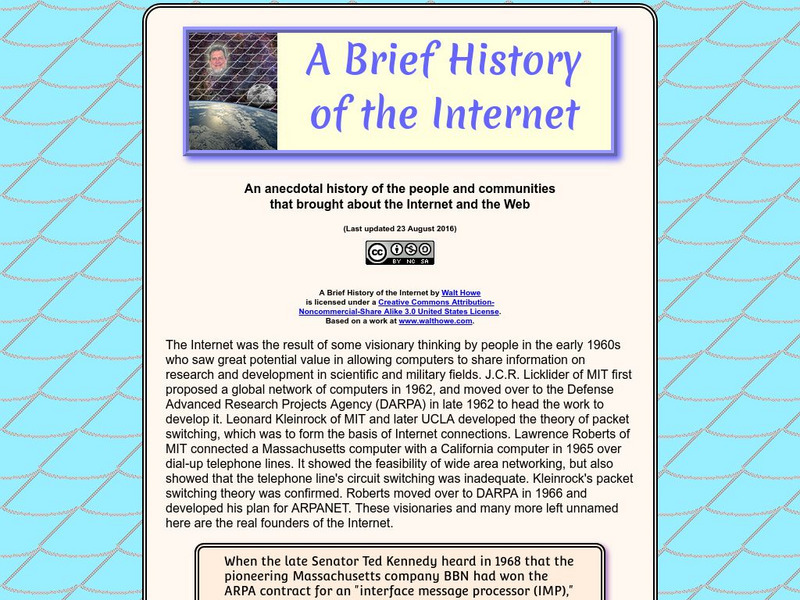TED Talks
Ted: Ted Ed: The Fundamentals of Space Time: Part 3
In this third and final lesson, CERN scientists Andrew Pontzen and Tom Whyntie explore what gravity means for space-time- or rather, what space-time means for gravity. [3:27]
TED Talks
Ted: Ted Ed: The Fundamentals of Space Time: Part 2
In this second installment of a three-part series on space-time, CERN scientists Andrew Pontzen and Tom Whyntie use a space-time diagram to analyze the sometimes confounding motion of light. [4:50]
TED Talks
Ted: Ted Ed: The Basics of the Higgs Boson
Using the Socratic method, CERN scientists Dave Barney and Steve Goldfarb explain the exciting implications of the Higgs boson. [6:30]
TED Talks
Ted: Ted Ed: What Happened to Antimatter?
CERN scientist Rolf Landua returns to the seconds after the Big Bang to explain the disparity that allows humans to exist today. [5:16]
TED Talks
Ted: Ted Ed: The Beginning of the Universe, for Beginners
How did the universe begin and how is it expanding? CERN physicist Tom Whyntie shows how cosmologists and particle physicists explore these questions by replicating the heat, energy, and activity of the first few seconds of our universe,...
Other
Cern Document Server Library Catalogue
Search the library catalogue for any term or subject. Provides multiple display search options and access to articles and preprints, books and conferences, periodicals, viedeotapes and more.
Other
Cern: The Delphi Experiment
This is the home page of the DELPHI experiment at CERN. It provides links to various parts of the experiment and explains the operation of the detector. The general operation is explained at a basic level, but the physics is much more...
Other
The World Wide Web: A Very Short Personal History
An article by Tim Berners-Lee that focuses on the history of the WWW from his point of view.
Other
Sciencebase and Elemental Discoveries: Sciencebase: Large Hadron Collider
Learn facts about the Large Hadron Collider project and its impact on the world of physics research.
Other
The Big Picture: Large Hadron Collider Nearly Ready
Published before the Large Hadron Collider (LHC) first beam, these high quality photos--twenty-seven total--offer a fascinating look at the the LHC, its creation, and its experiments. Each large photo is accompanied by a simple caption.
Other
Xml: Berners Lee and the Semantic Web Vision
Read an article by XML highlighting a presentation by World Wide Web creator Tim Berners-Lee in which he describes his vision for the Semantic Web. Includes slides from Mr. Berners-Lee's talk.
US Department of Energy
Fermilab: Questions About Physics: Big Bang & Bosons
What are serious scientists are saying about bosons? This site provides text correspondence between two scientists in question-answer format. Shows why bosons are so important in particle physics.
Science Struck
Science Struck: What Is the Higgs Boson Particle?
A detailed explanation of the Higgs Boson particle and the science of particle physics. Discusses the history of the search for this particle, the ongoing research with the Large Hadron Collider at CERN in Europe, and what is known so...
Other
Cern: The Large Hadron Collider
A thorough introduction to the Large Hadron Collider (LHC), organized into several sections. Read about LHC experiments, milestones, and safety measures.
Other
Hands on Cern: Explore the Smallest Components of Matter
An online course in particle physics with colorful images, charts and animations. Begin by learning about the Standard Model and the types of particles, particle families, and forces, then carry this knowledge over to your study and...
Exploratorium
Exploratorium: Cern: Linear Accelerator
From CERN, the European Center for Nuclear Research, this site provides a brief description of the physics underlying how a linear accelerator works.
Exploratorium
Exploratorium: Cern: Accelerate the Particle
Contains a game which illustrates the manner in which changing electromagnetic fields can accelerate charged particles in a linear accelerator.
Other
Cern: The L3 Experiment
This is the home page of the L3 experiment at CERN. The basic detector description is easy to follow, but the physics is more advanced.
Other
Internet Learning Tree: A Brief History of the Internet
An anecdotal history of the people and communities that brought about the internet.
Other
Particle Physics at Discovery's Horizon: What Is the Lhc?
An introduction to the Large Hadron Collider (LHC), offering information on its location, its experiments, and what scientists hope to learn through this machine buried below Geneva, Switzerland. Click a menu of links to read details...
Other
American Institute of Physics: Where Does the Neutron Get Its Spin?
Describes two experiments on neutron spin. This is how physicists work.
Other
A1 Collaboration: Wa 89 Hyperon Beam Experiment
Report of hyperon beams used for "spectroscopy of charmed strange baryons and exotic multiquark states". These experiment(s) "aims at the better understanding of charm and baryon production and their decay properties governed by an...
Curated OER
An Opal Event
This is the home page of the OPAL experiment at CERN. The basic tour showing the operation of the detector is easy to follow. The physics is more difficult.
Curated OER
Opal Detector
This is the home page of the OPAL experiment at CERN. The basic tour showing the operation of the detector is easy to follow. The physics is more difficult.







